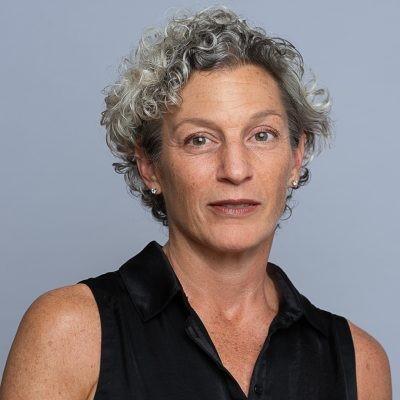 Dr. Marissa Moorman is a professor in the Department of African Cultural Studies, in University of Wisconsin. Her publications include: “Luanda Humms and Buzzes: Urban Soundscapes, Club Music, and Dance, 1960-present.” In Hossfeld, et al. (eds.) Ten Cities: Berlin, Bristol, Cairo, Johannesburg, Kiev, Lagos, Lisbon, Luanda, Nairobi, Naples (2020); Powerful Frequencies: Radio, State Power, and the Cold War in Angola, 1933-2002 (2019); and Intonations: A Social History of Music and Nation in Luanda, Angola, from 1945 to Recent Times (2008).
Dr. Marissa Moorman is a professor in the Department of African Cultural Studies, in University of Wisconsin. Her publications include: “Luanda Humms and Buzzes: Urban Soundscapes, Club Music, and Dance, 1960-present.” In Hossfeld, et al. (eds.) Ten Cities: Berlin, Bristol, Cairo, Johannesburg, Kiev, Lagos, Lisbon, Luanda, Nairobi, Naples (2020); Powerful Frequencies: Radio, State Power, and the Cold War in Angola, 1933-2002 (2019); and Intonations: A Social History of Music and Nation in Luanda, Angola, from 1945 to Recent Times (2008).
The topic of Dr. Moorman’s talk was Angola Radio in Five Songs. She featured the state and radio relations in Angola since the colonial administration in different political systems: during colonialism, in the struggle for independence, after independence, during the civil war in a cold war context, and finally after the peace treaty that ended the Angolan long civil war. Dr. Moorman used song and radio broadcasts to organize her talk. Radio broadcasting in the colonial and postcolonial Angolan state was necessary to inspire confidence and create nervousness. Similarly, Dr. Moorman shared music clips to demonstrate how songs reflected affect, dissent, longing for prospects, cosmopolitanism, and different political ideologies in the colonial and postcolonial Angolan state.
The trend of using radio in Angola dates back to the 1930s with member-based radio clubs among the Portuguese settlers. It was first intended to connect the settlers across the vast territory of Angola. Radio clubs also projected regional stability and connections as there was a proposition to broadcast radio programs in other languages spoken in neighboring countries such as South Africa. Besides, for the settlers residing far from the conservative and oppressive Portuguese state, being a member of radio clubs, doing racecars, and listening to love songs in Spanish meant becoming more European, white, and modern. As a result, the settlers developed a new form of identity, as ‘white Angolans’, and different politics.
In addition to being instrumentalized as a military strategy, Dr. Moorman argued, radios were very powerful transducers that changed immaterial sound waves into material effects. Since 1961 when the war for independence broke out, the colonial state began to use radio broadcasting, urban development, and building infrastructures as counter-insurgency and as the colonial state’s strategy to form closer relations with ordinary Angolan society. Similarly, insurgency movements engaging in the guerilla fighting against the colonial state broadcasted radio programs and songs, creating various forms of colonial nervousness to their listeners. For example, the state and its security personnel’s nervousness was originated from losing power and control over Angola. For the Portuguese settlers listening to the insurgent’s radio broadcasts brought another form of colonial nervousness was due to the fear of losing the new identity that had transformed them from feeling ‘unwhiteness’ to that of more European, white, and modern. On the contrary, as Dr. Moorman noted, the ordinary Angolan society both developed a sense of participation in the struggle for independence when listening to insurgencies’ radio broadcasts, although they were in exile or engaging in their day-to-day activity in the state.
According to Dr. Moorman, after the declaration of independence in 1974, radio continued to be a platform through which ideological differences, dissents, and schisms within the ruling party MPLA (People’s Movement for the Liberation of Angola) were entertained led to the 1977-attempted coup. After the coup incident, MPLA showed its seriousness about radio and radio station by restructuring the nature, administration, and utilization of radio and radio station. The national radio station that was reformed after the coup became a highly guarded and controlled institution; its employees were also required to show their loyalty to the party. Party loyalty was also a privilege that gave the employees the freedom to operate without much interference from the party. The national radio station also epitomized the Angolan socialist state’s promises by providing subsidized lunch, free health care, entertainment, and schooling to the employees and their families.
Dr. Moorman claims that UNITA’s radio broadcasting from 1979-1998 is a story of radio and ambition for state power. UNITA, the then leading militant insurgent group fighting against the postcolonial state, exploited radio broadcasts to unnerve the post-independent Angolan state, regional and global actors, and peace brokers in the context of the cold war. The journalists’ and broadcasters’ analysis and interpretations of the Angolan civil war in geopolitical terms structured radio as part of the daily life of Angolans and the broader population in the region. The UNITA’s radio station establishment with the financial and logistic support of the USA and South African government illustrates how vital radio was in addressing different parties’ interests.
Dr. Moorman remarked that MPLA took over and grew the colonial institutional skeleton of radio, making the national radio station the high-functioning state institution. However, the state radio remained an institution that revealed the postcolonial state composed of competing ideas and different interests.
Recap written by Yekatit G. Tsehayu